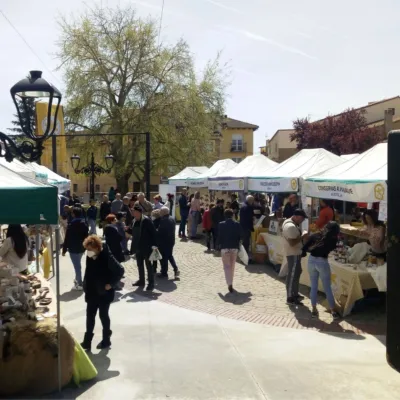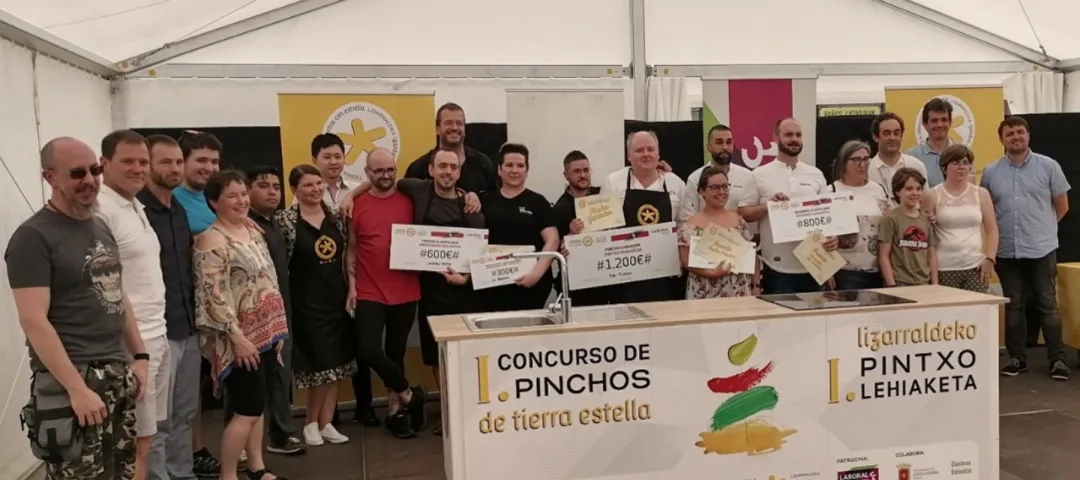General information
RDP Priority
- P6. Social inclusion and local development
RDP Focus Area
- 6B: Local development
RDP Measure
- M19: LEADER/CLLD
Beneficiary type
- Local Action Group
Summary
The ‘Food with “Estrella”’ project was promoted by the TEDER Association, a Local Action Group (LAG) from Tierra Estella in Navarre, Spain. It responded to the need to enhance the visibility, recognition, and consumption of local agri-food products in a region that is rich in agricultural diversity but which faces commercial fragmentation and post-COVID-19 pandemic disruption.
Building on previous experiences and leveraging strong territorial identity, the project aimed to reconnect producers, retailers, and the hospitality sector with local consumers and tourists through a shared regional food brand. The initiative targeted products that were locally produced and/or processed in Tierra Estella, encouraging sustainable practices. TEDER facilitated the inclusion of producers based on their territorial linkages, without applying formal technical validation.
Project activities included: stakeholder mobilisation; development of the ‘Food with Estrella’ visual identity; creation of promotional materials and a dedicated website; a series of agri-food markets across the region; retail and camping point-of-sale facilities; a gastronomic contest involving restaurants; and educational workshops in schools.
The project fostered greater visibility for local food and supported short supply chains. It created tools and partnerships that could facilitate further integration with sustainable tourism strategies.
Results
- The ‘Food with Estrella’ project significantly enhanced the visibility of local food and engaged a wide range of stakeholders.
- The project succeeded in fostering a shared identity around Tierra Estella’s food heritage and in differentiating local commerce from mass retail chains.

Promoter
TEDER – Tierra Estella Development Association
Funding
Total project budget: 162 313 (EUR)
EAFRD: 105 503 (EUR)
National/Regional: 26 376 (EUR)
Private/own: 30 434 (EUR)
Ressources
Context
The ‘Food with Estrella’ project was initiated by the TEDER Association, a Local Action Group (LAG) with longstanding experience in rural development and sustainable food systems. Located in the Tierra Estella region of Navarre (Spain), TEDER operates in a geographically diverse area with rich agroecological potential, ranging from mountain livestock production to irrigated horticulture. This diversity results in a wide range of high-quality local products, such as Navarra and Rioja wines, Navarra asparagus, Lodosa piquillo peppers, truffle products, cheeses, honey, and artisanal preserves.
The project emerged as a continuation of previous local food initiatives, especially following the disruption caused by the COVID-19 pandemic, which significantly impacted small producers. Earlier efforts to build a local distribution network (‘De Casa Etxekoa’) laid the groundwork, but these efforts lacked continuity. TEDER shifted its focus from logistics to visibility and consumer awareness, designing a campaign to enhance the recognition, accessibility, and consumption of locally produced food.
The initiative targeted products produced and/or processed in Tierra Estella, encouraging alignment with organic, integrated or sustainable practices. Participation was open to local producers, and TEDER promoted responsible production without requiring formal environmental certification. The project responds to urgent rural development challenges: reinforcing short supply chains, encouraging eco-friendly practices, stimulating local commerce and tourism, and reconnecting the public, especially young people, with their food heritage.
The project, led by TEDER, engaged over 40 producers, 18 hospitality businesses, local retailers, schools and municipalities. Partners included the Council of Organic Agricultural Production of Navarre, INTIA (Navarre Institute for Agri-food Technologies and Infrastructure), as well as business and tourism associations. While these entities supported awareness-raising activities and the visibility of local food, no formal certification role or quality control mechanism was implemented in the project.
Objectives
The main objective of the project was to raise awareness and promote the consumption of local agri-food products from Tierra Estella, reinforcing their identity and their value within both the local community and the tourism sector.
Activities
Project activities included:
- stakeholder mapping and mobilisation - TEDER, the LAG and project promoter, visited all municipalities in Tierra Estella to identify producers, retailers and hospitality centres. More than 40 farmers/processors registered voluntarily. Local councils supported the project by offering venues free of charge for events and meetings.
- brand development and communication toolkit - the project created the ‘Alimentos con Estrella’ brand from scratch, including its visual identity and communication assets. A regional design SME developed the logo, point-of-sale materials such as shelf talkers, eco-bags, and aprons, along with a media plan. EAFRD financed the prototypes; retailers co-financed the final prints, and the municipal press offices amplified the campaign.
- digital platform and social media launch - the project launched the website along with dedicated social media profiles. The platform included a geolocated producer directory, an events calendar, and consumer-oriented content. Development was funded through CAP resources, while a local IT start-up managed post-launch maintenance under a service contract financed by TEDER’s own budget.
- itinerant agri-food markets - eight festive street markets rotated through valley, mid-mountain and riverside towns, combining sales stands with music, theatre and tasting zones. EAFRD funded logistics (tents, cold storage), while municipalities provided the venues (public squares); more than 40 producers sold their products directly, shortening the chain and cutting food miles.
- retail and campsite point-of-sale activation - 32 grocery shops and nine camp-sites installed branded displays and fridges for local food, improving product visibility, consumer access, and promotional consistency across tourist and local retail points.
- ‘Pinchos with Estrella’ gastronomic contest - 18 bars and restaurants crafted tapas using local ingredients. The event was organised in collaboration with local hospitality associations. The project funded the contest’s promotional activities and a live cooking show finale!
- school outreach and farm visits - 11 primary schools joined workshops on healthy eating and biodiversity; pupils visited cheese dairies, vineyards and apiaries. CAP support paid for the creation of teaching kits, and bus transport was financed by the Mancomunidad de Montejurra water authority.
- ‘Tierra Estella Local Food Day’ fair - A two-day flagship event in Estella-Lizarra combined the pincho contest finale, an enlarged market, concerts and cooking shows, reaching 6 000 visitors and showcasing over 40 producers. The fair served as a vibrant meeting point between rural stakeholders and urban consumers, reinforcing regional identity and supporting short supply chains through direct sales.
Main results
- The ‘Food with Estrella’ project significantly enhanced the visibility of local food and engaged a wide range of stakeholders. Through extensive outreach, many local producers joined the campaign, and retail and tourism outlets helped increase public awareness. A series of agri-food markets across Tierra Estella facilitated direct-to-consumer access, strengthening short supply chains and reinforcing the territory’s food identity.
- The ‘Pinchos con Estrella’ contest mobilised 18 restaurants and bars, showcasing innovative recipes with locally produced ingredients and drawing significant public attention. Eleven primary schools participated in educational activities, contributing to long-term consumer awareness and cultural transmission.
- The campaign's visual identity became widely recognisable in the area, with stickers, eco-bags and signage reinforcing the message in commercial and tourism spaces. The project website, with a geolocated map of producers and events, became a reference for local food access.
- Qualitatively, the project succeeded in fostering a shared identity around Tierra Estella’s food heritage and in differentiating local commerce from mass retail chains. While no formal jobs were created, the project helped raise awareness of local products and encouraged collaboration among producers, retailers and hospitality businesses, contributing to a more connected rural food ecosystem. A new phase of development, aligned with regional tourism strategies, is now underway, and is expected to open further funding and opportunities in the 2024–2026 period.
Key lessons
- One of the lessons from the ‘Food with Estrella’ project is that promotional initiatives in rural areas require sustained, personalised engagement with stakeholders. While the project successfully mobilised producers, retailers and hospitality businesses, maintaining momentum proved challenging without continuous institutional support. Informal communication, calls, visits and hands-on facilitation were far more effective than email campaigns alone, especially with small producers who often work in isolation.
- The project also revealed that short-term actions, although impactful, need a long-term vision and financing model to avoid fragmentation. Efforts to establish lasting habits (e.g. sourcing local food, branding, market attendance) need time, repetition and trust-building.
- An interesting outcome was the recognition by local commerce of the strategic value of differentiation: many shops saw local food promotion not just as ethical, but as a way to compete with large retailers through identity and quality.
- For others aiming to implement similar actions, the project holders recommend assigning dedicated personnel with time to maintain direct contact with participants, securing hybrid funding models for continuity and integrating food identity into other territorial policies (e.g. tourism, education, sustainability). Above all, patience and social engagement skills are essential to weaving together the social fabric that sustains rural food systems.
This project was not just about promotion; it was about giving visibility to what we already have: quality local products that define our territory. Many retailers told us they now feel more recognised and see local food as a way to differentiate themselves from large supermarket chains.
The food markets and the ‘Pinchos con Estrella’ contest were very well received. But what we really learned is that without external funding, these initiatives are hard to sustain on their own. Stakeholders are enthusiastic when you propose something concrete, but long-term commitment is a different story.
Eva Santamaría
Project Manager

